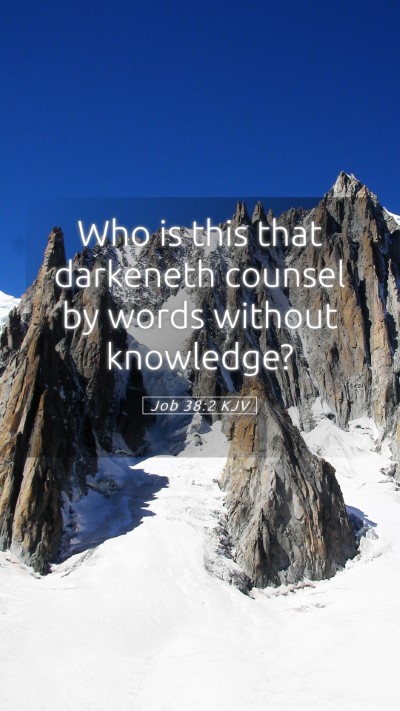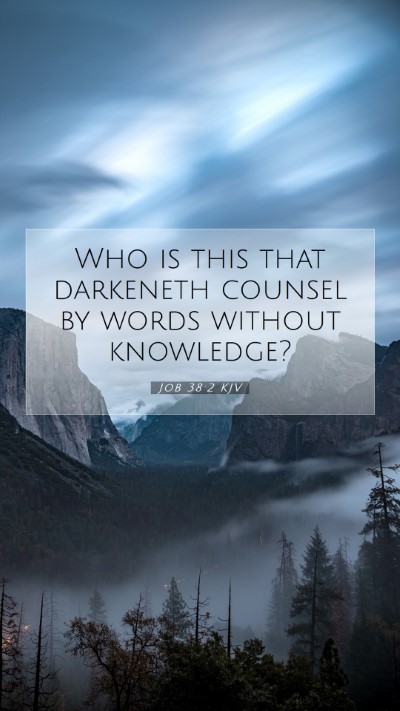Understanding Job 38:2 - A Comprehensive Bible Verse Commentary
Job 38:2 states: "Who is this that darkens counsel by words without knowledge?" This verse marks a significant moment of divine response to Job, revealing God’s authority and the limitations of human understanding. Below, we provide a thorough analysis of this scripture based on various public domain commentaries, particularly drawing insights from Matthew Henry, Albert Barnes, and Adam Clarke.
Context of Job 38:2
The Book of Job is a profound exploration of suffering, justice, and divine sovereignty. Job, a man of great faith, endures immense suffering and wrestles with the silence of God in his tribulations. Initially, his friends offer their interpretations regarding the reasons for his suffering, which leads to a series of dialogues filled with uncertainty and questions. Job 38 marks the beginning of God’s response to Job, illuminating different aspects of divine wisdom and the limits of human reasoning.
Verse Analysis
In Job 38:2, God addresses Job directly, setting the stage for a series of rhetorical questions meant to highlight Job's lack of understanding regarding the divine order and the complexity of creation.
- Darkening Counsel: This phrase indicates that Job’s words, filled with questions and challenges toward God's justice, obscure the truth of divine wisdom. Matthew Henry notes that Job, in his anguish, has spoken without the full knowledge of God's purposes and the grand designs of creation.
- Words Without Knowledge: Albert Barnes emphasizes that Job spoke with a limited perspective shaped by his immediate experiences rather than an understanding of the broader cosmic reality governed by God. This underlines the theme of human ignorance in the face of divine omniscience.
- The Divine Response: Adam Clarke identifies this verse as a pivotal moment where God reveals His authority. The rhetorical nature of the question highlights that God is the source of true wisdom, and humans, especially in their suffering, may not grasp divine purpose.
Commentary Insights
The commentaries of Matthew Henry, Albert Barnes, and Adam Clarke provide rich insights into the meaning of this verse:
- Matthew Henry: He notes that God's reply doesn’t aim to answer Job's questions about suffering but instead directs Job to consider God's majesty in creation. The implication is that the created order is beyond simplistic human interpretation and judgment.
- Albert Barnes: Barnes elaborates on the significance of understanding human limitations. He posits that in questioning God, Job steps into territory that only God can truly comprehend, thus admonishing the reader to submit to divine wisdom.
- Adam Clarke: Clarke seeks to contextualize the phrase "darkens counsel" within the broader narrative. He suggests that Job’s situation parallels the human experience of grappling with suffering while failing to understand the full scope of God’s plan.
Thematic Exploration
Several key themes emerge from this verse:
- Humility Before God: This verse calls us to recognize our limitations and encourages humility in our approach to the divine. It serves as a reminder that our understanding is finite before God’s infinite wisdom.
- The Mystery of Suffering: In the context of Job's narrative, the verse prompts reflection on the mysteries of suffering and the idea that humans often lack the perspective to decipher God’s universal plans.
- Divine Sovereignty: God’s response underscores His sovereignty over creation, reminding believers that His ways may be beyond human grasp, yet are ultimately good and just.
Application to Daily Life
In applying the insights gained from Job 38:2 to our lives, we can reflect on several aspects:
- Trust in Divine Wisdom: When faced with trials, we can learn to trust God’s wisdom, recognizing that our understanding is limited compared to His eternal perspective.
- Seeking Knowledge Cautiously: As we engage with difficult questions about faith, suffering, and justice, we should approach discussions with reverence and caution, understanding that not all answers will be within our grasp.
- Fostering Humility: This passage challenges us to cultivate humility, acknowledging our finite knowledge and inviting God into our struggles for guidance and strength.
Cross References
This verse resonates with several other scriptures that highlight God's sovereignty and human limitation:
- Isaiah 55:8-9: "For my thoughts are not your thoughts, neither are your ways my ways," says the Lord.
- Romans 11:33: "Oh, the depth of the riches of the wisdom and knowledge of God! How unsearchable his judgments, and his paths beyond tracing out!"
- Psalms 139:6: "Such knowledge is too wonderful for me, too lofty for me to attain."
Conclusion
Job 38:2 serves as a reminder of the profound gap between divine knowledge and human understanding. As we explore Bible verse meanings and delve into scripture analysis, let us embrace the humility and trust that God is indeed working all things for good. In Bible study groups or online Bible study settings, this verse can spark meaningful discussions about the nature of God, human suffering, and the pursuit of wisdom.


